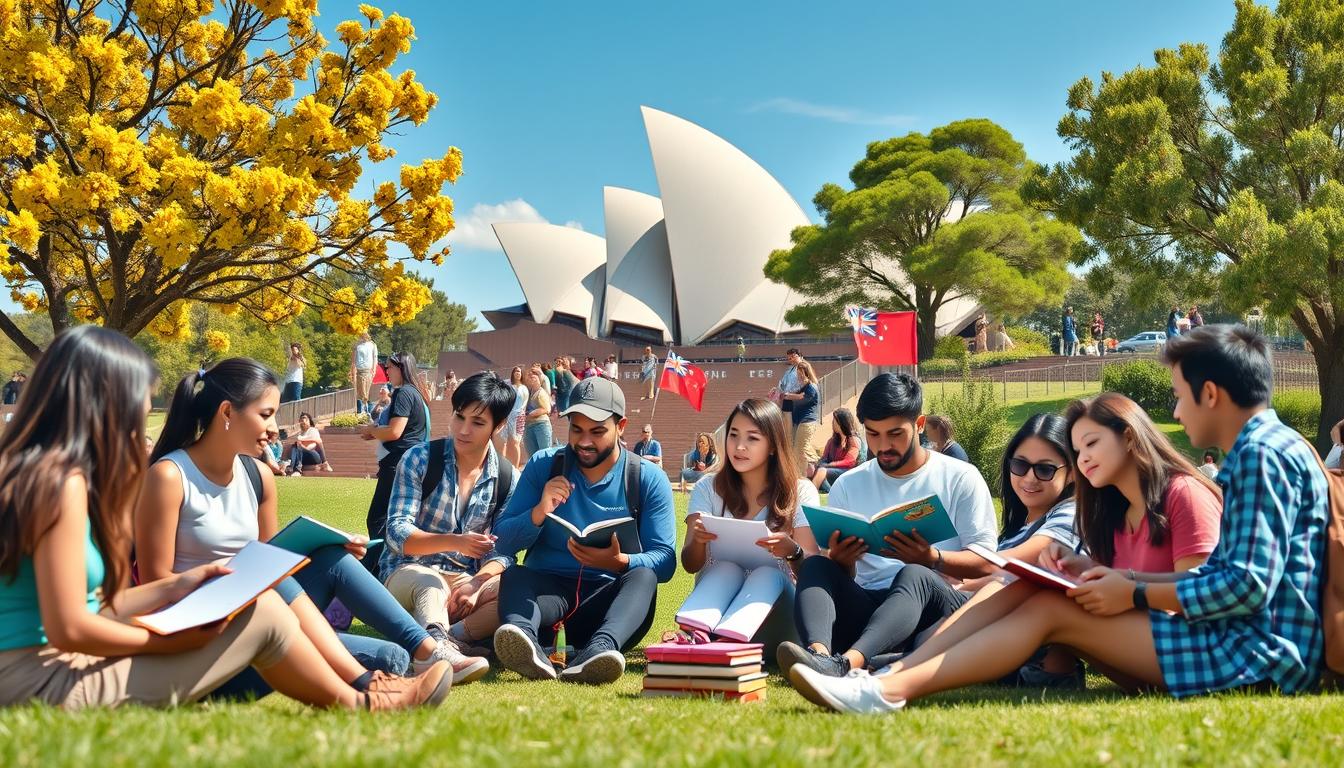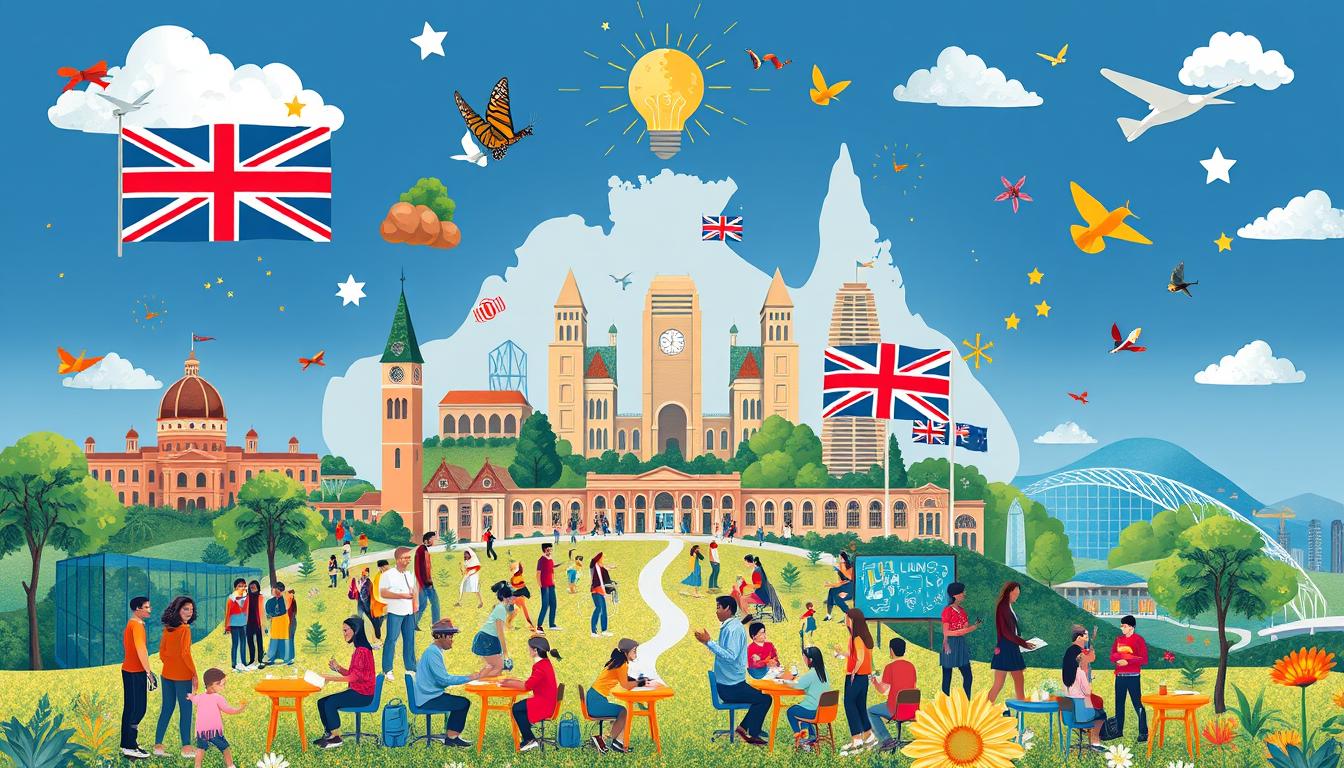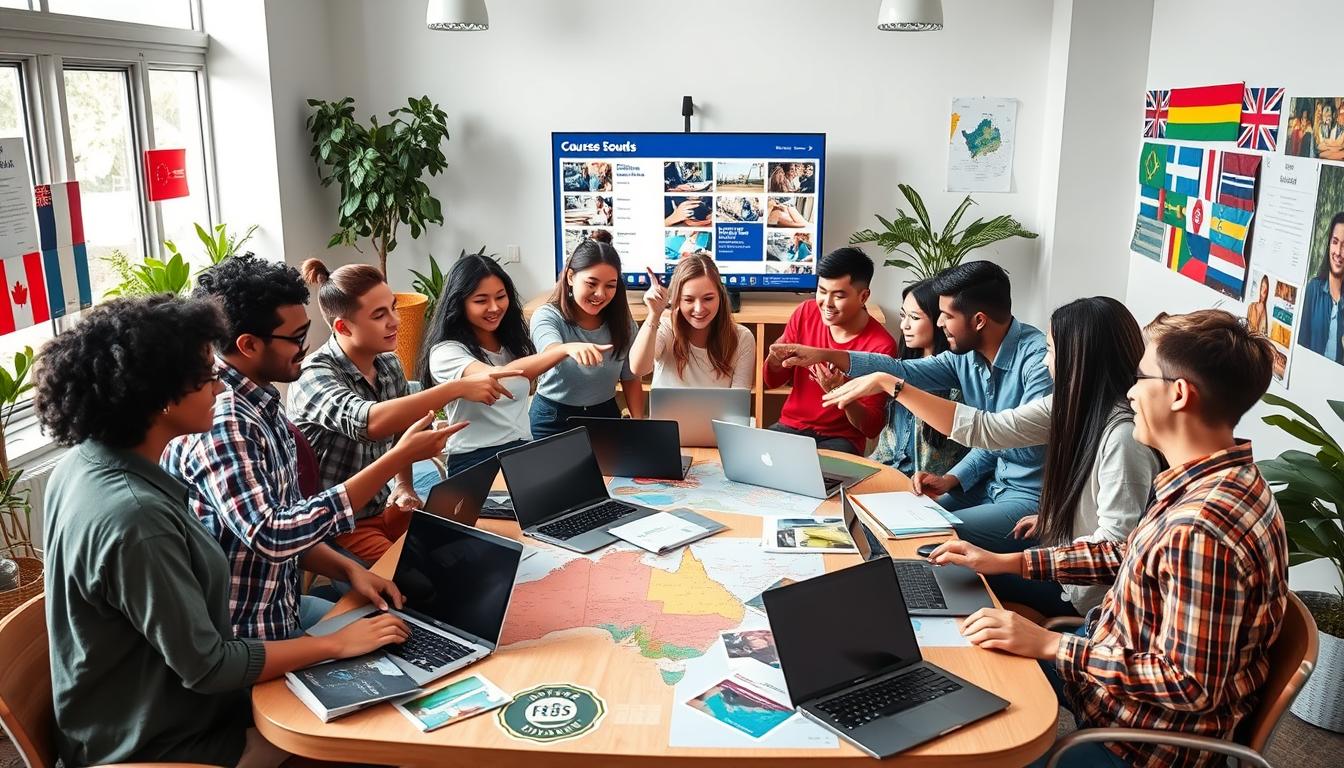Studying Abroad in Australia Comprehensive Guide for International Students
Studying abroad in Australia is a great chance for international students. It offers a top-notch education, a mix of cultures, and memorable experiences. Australia has famous universities, a rich culture, and a friendly community. This makes it perfect for students wanting to grow both in school and life.
This guide will help you with the key parts of studying in Australia. You’ll learn about the education system, choosing the right course, getting a student visa, and handling money. It’s made for those thinking about getting an undergraduate, postgraduate, or doctoral degree. This guide will give you the info you need to make a smart choice and start your study abroad adventure in Australia.
Key Takeaways
- Australia has a diverse range of universities, including 40 government-funded, two international, and one private specialized institution.
- The Australian Qualifications Framework (AQF) ensures globally recognized degrees.
- Popular courses in Australia include Accountancy, Agricultural Science, Nursing, IT, Education, Project Management, Law, and Social Work.
- English language proficiency requirements vary for undergraduate, postgraduate, and doctoral programs.
- The Subclass 500 Student Visa is essential for international students in Australia.
Know the Education System in Australia
If you’re an international student starting your studies in Australia, it’s key to know the country’s education system. It includes primary and secondary schools, and then a strong tertiary education section. With 43 universities, students can choose from on-campus undergraduate degrees or advanced postgraduate programs.
The Australian Qualifications Framework (AQF)
The Australian Qualifications Framework (AQF) is at the heart of Australia’s education. It sets the standards for post-high school education and vocational training. This framework helps students move smoothly through their studies and into their careers.
It covers 10 levels, from certificates and diplomas to bachelor’s, master’s, and doctoral degrees. The AQF is flexible, supporting learning and career growth throughout life.
- Australia’s schools go from Kindergarten/Preparatory to Year 12, lasting 13 years.
- ELICOS programs help students improve their English in 5 to 60 weeks, based on their current level.
- Foundation courses last a year, preparing students for undergraduate studies.
- VET programs offer 1 to 4 years of practical skills training.
- Undergraduate degrees are usually 3 years long, but 4 years with honors.
- Postgraduate programs, like master’s and doctoral degrees, take 1 to 3 years.
Top universities like the University of Melbourne and the University of Sydney are known for their tough courses and leading research. Studying here means getting a top-notch education and great chances for personal and career growth.
Select the Right Course for Study Abraod in Australia
Choosing the right course is key when studying abroad in Australia. Do your homework on universities and colleges that offer your program. Look at the course content, the expertise of the faculty, and where it’s located. Also, think about what jobs are in demand to boost your job prospects after you graduate.
Australia has many university programs and academic disciplines to pick from. Each one is made to give you skills that will help you stand out in the job market. You can study everything from Accountancy to Agricultural Science, Nursing to IT, and more.
There are also courses in Education, Project Management, Law, and Social Work that are in high demand. Choosing these courses can increase your chances of getting a job. It also opens up more visa options, scholarships, and chances for Permanent Residency (PR).
Some students go for Professional Year Programs (PYPs) if they want to start a career right away. These programs give you real-world experience and training in your chosen field. They help you move smoothly from school to work.
| Program | Duration | Credit Hours | GPA Requirement | Cost |
|---|---|---|---|---|
| Open Campus Block | 6-18 weeks | 6-7 per Block semester hours/9-10.5 per Block quarter hours | 2.5 Overall GPA | $6,950 per Block |
| Arts + Sciences | 20 weeks | 14-18 semester hours/21-27 quarter hours | 3.0 Overall GPA | $20,850 |
| January in Sydney | 3 weeks | 3 per session semester hours/4.5 per session quarter hours | 2.5 Overall GPA | $4,250 |
| Summer Global Internship | 8 weeks | 6 semester hours/9 quarter hours | 2.5 Overall GPA | $6,950 |
| Summer in Sydney | 6 weeks | 6-7 per Block semester hours/9-10.5 per Block quarter hours | 2.5 Overall GPA | $6,650 |
Admission Requirements for Australian Universities
Getting into an Australian university requires different things from each school. You’ll need your academic qualifications, English language skills, and sometimes an interview. Make sure to check the exact requirements of your chosen university for a smooth application.
Undergraduate Degree Requirements
To start an undergraduate program, you usually need to finish something like Australia’s Year 12. This could be the All India Senior School Certificate, the China People’s Republic National Entrance Examination (GaoKao), or the Sri Lankan GCE Advanced Level. Some programs also ask for specific subjects or grades.
Postgraduate Degree Requirements
For postgraduate studies, you’ll likely need a degree from a recognized institution. Your work experience and English language skills might also be looked at.
You might need to take tests like the International English Language Testing System (IELTS) or the Pearson Test of English (PTE) to show your English level. Each university and program has its own score needs.
The competition to get into Australian universities is tough. Just meeting the minimums doesn’t mean you’re in. Getting help from overseas education consultants can really boost your chances of getting into your top program.
Obtaining a Student Visa for Australia
If you want to study in Australia, you need to get a student visa. This is called the Subclass 500 Student Visa. You must provide many documents to the Australian Department of Home Affairs. These include:
- Completed visa application
- University-issued application letter
- Statement of Purpose
- Marriage certificate (if applicable)
- Medical reports
- Valid passport
- Police clearance certificates
- Proof of financial means and related documents
- Processing fees for the visa application
All international students must have Overseas Student Health Cover (OSHC). This covers medical care, medicines, and ambulance services in Australia. You might also need health exams before coming to Australia.
You can find all the visa details on the Department of Home Affairs website. They let you apply online with ImmiAccount. Education agents can help with your study plans but can’t give immigration advice unless they are registered.
On average, it takes about four weeks to process a student visa, and it costs around AUD $1,600. While studying, you can work up to 48 hours a fortnight during your course and as much as you want during breaks.
It’s best to apply for a student visa 8 weeks before your course starts. This ensures you get your visa on time. You’ll need to show proof of money, health cover, your qualifications, ID, and enough funds for living and tuition.
| Key Requirement | Details |
|---|---|
| Proof of Financial Capacity | At least $29,710 to cover costs such as travel, course fees, and rent |
| Overseas Student Health Cover (OSHC) | Required to cover medical or hospital care, prescription medicines, and ambulance services |
| Character Requirements | Answering questions about past conduct and providing a police background check |
| Health Examinations | May be required to meet the student visa health requirement |
| Application Process | Apply online using ImmiAccount on the Department of Home Affairs website |
| Processing Time | Average of 4 weeks |
| Visa Cost | Approximately AUD $1,600 |
| Work Allowance | Up to 48 hours per fortnight during course session, unlimited during breaks |
| Visa Duration | One or two months longer than the course length |
| Application Timeline | Apply at least 8 weeks before course start date |
Financial Planning for Study Abroad in Australia
Studying in Australia can change your life, but it’s costly. As an international student, you need a solid budget. This budget should cover tuition, living costs, and unexpected expenses. Luckily, Australia has many resources to help you manage your money and make studying abroad more affordable.
Tuition Fees and Living Costs
The cost to study in Australia varies by university, program, and location. Tuition for a semester through an exchange program is often under $4,000. Direct enrollment can cost between $10,090 and $12,689 per term. Living in Australia can be expensive, with a one-bedroom apartment in the city center costing from $1,095 in Adelaide to $2,002 in Sydney.
Funding Your Studies
- Scholarships: Australia has many scholarships for international students, both merit-based and need-based. Applying for these can lower your costs.
- Part-time Work: You can work up to 40 hours a fortnight, which helps with expenses.
- Financial Aid: Universities and government programs offer loans and grants to help international students.
| Expense | Estimated Cost |
|---|---|
| Tuition (per semester) | $10,090 – $12,689 |
| Rent (monthly, city center) | $1,095 – $2,002 |
| Utilities and Internet | $227 per month |
| Meals | $15 – $80 per week |
| Transportation | $114 per month |
| Personal Expenses | $4,000 per semester |
Understanding the costs and resources available helps you make smart choices. This way, you can handle the financial side of studying abroad in Australia.
Accommodation and Living Expenses in Australia
As an international student in Australia, you’ll find many places to live. Each option has its own costs. You can choose from on-campus living, shared apartments, or private rentals. The price depends on where you live, the size of your room, and if you share with others.
Living on campus usually costs between A$750 to A$1,700 a month. Homestay, where you stay with an Australian family, costs A$940 to A$1,300 monthly. Shared apartments are cheaper, costing A$440 to A$1,100 a month. Private rentals are pricier, ranging from A$1,100 to A$2,200 a month.
You’ll also spend money on food, transport, utilities, and healthcare. International students usually set aside A$20,000 to A$30,000 a year for these. This works out to about A$1,400 to A$2,500 a month.
| Accommodation Option | Average Monthly Cost (AUD) |
|---|---|
| On-campus Residences | $750 – $1,700 |
| Homestays | $940 – $1,300 |
| Shared Apartments | $440 – $1,100 |
| Private Rentals | $1,100 – $2,200 |
When planning your budget for Australia, check the cost of living in your study city. Prices differ across regions. The Cost of Living Calculator can help estimate your expenses.
Conclusion
Studying abroad in Australia is a great chance to get a top-notch education and experience a vibrant culture. It’s known for its safe and welcoming places and stunning nature. This makes Australia perfect for students looking to grow both in school and personally.
This guide helps you make a smart choice and get your student visa. It also shows how to handle your money and start your study abroad adventure in Australia. It covers everything you need to know to begin your journey.
Australia is known for its excellent universities, diverse culture, and support for international students. It’s a top pick for those wanting a fulfilling study abroad experience. You’ll find amazing academic opportunities, cultural diversity, and great career chances in Australia.
FAQ
What is the Australian education system like?
The Australian education system includes primary, secondary, and tertiary levels. It boasts 43 universities, with 40 government-funded, two international, and one specialized. Students can choose from undergraduate degrees, postgraduate programs, vocational courses, and more. The Australian Qualifications Framework (AQF) provides a structured approach to higher education and vocational training.
How do I select the right course for study abroad in Australia?
Think about the course content, faculty expertise, and how it will affect your career. Australia offers a variety of popular programs like Accountancy, Agricultural Science, Nursing, IT, Education, Project Management, Law, and Social Work. Professional Year Programs (PYPs) are great for those wanting a direct career start.
What are the admission requirements for Australian universities?
Admission needs vary by institution and may include academic records, English language skills, and sometimes interviews. Make sure to check the specific requirements of your chosen university. Getting into top universities requires hard work, but it’s worth it.
How do I obtain a student visa for Australia?
You need the Subclass 500 Student Visa to study in Australia. You’ll need to provide a completed visa application, a letter from your university, a Statement of Purpose, and other documents. These include your passport, police certificates, financial proof, and the visa fee.
How can I manage the financial aspects of studying abroad in Australia?
Studying in Australia can be costly, but there are ways to handle your money. Look into scholarships and part-time jobs. Make a budget that covers tuition, living costs, and unexpected expenses.
What are the accommodation and living expense options in Australia?
Students in Australia can choose from on-campus housing or shared apartments. Costs depend on location, living space size, and whether it’s shared or private. Research and book your housing early to get a good deal.



